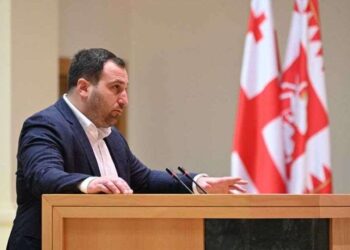US Ambassador to Georgia Kelly Degnan has released a statement on the 30th anniversary of diplomatic relations with Georgia.
In the statement, Ambassador Degnan talks about the relations between the two countries during this period and explains why Georgia is important to the United States.
The statement of the US Ambassador reads as follows:
“This year, we in the United States Embassy in Tbilisi are celebrating 30 years of our diplomatic relations, partnership, and friendship with Georgia. We have ambitious plans to celebrate the full range of our partnership throughout the year. Today, I’d like to look back to the start of our relationship and reflect on why the United States cares so much about Georgia.
Thirty years ago, Georgia regained its independence after nearly 200 years of domination from Moscow. During these often-difficult years, the people of Georgia have persevered and overcome many hardships to establish Georgia as a modern and democratic state, built on the foundation of its European history, dating back to Colchis and the birth of Western civilization. From the beginning of Georgia’s regained independence, the American people have stood with Georgia in solidarity with Georgians’ desire to be a free and sovereign country.
While the United States first established a diplomatic presence in Batumi in 1890, our renewed partnership officially started with President George H.W. Bush recognizing Georgia’s independence on December 25, 1991.We formally established diplomatic relations on March 24, 1992, and opened our embassy in what became the Sheraton Metekhi less than a month later. The following year, we moved to the beautiful Orbeliani palace before eventually moving to our New Embassy Compound in Dighomi in 2005.
Over the years, the United States and Georgia have developed into strategic partners, working together toward a shared vision of Georgia fully integrated in the Euro-Atlantic family of nations and part of a Europe whole, free and at peace. This is a vision that takes hard work, patience, and significant resources to realize. The United States has allocated almost $6 billion in assistance funds to Georgia, in addition to other forms of support. We’ve been privileged to support a remarkable number of successful initiatives with Georgian partners who are determined to see this country reach its full potential as a strong, independent democracy.
In the early days, U.S assistance was primarily humanitarian – including food and medicine – as we helped Georgia weather the fighting and mass displacement in the 1990s and handle the transition to a market economy. As the situation stabilized, we adjusted our support to meet the priorities identified by our Georgian counterparts. We began to provide development and economic assistance to help Georgia establish democratic and free market institutions that are essential to promoting and safe-guarding prosperity and human dignity.
As Georgia has grown and matured as a state over the years, U.S. assistance has changed as well, always aligned with the people of Georgia’s needs and priorities. Much of our assistance these days is less obvious than previously. That is as it should be, as Georgia, compared to the early years of independence, has developed its own abilities and resources to provide for the country’s needs. Our role has shifted over time to being more behind the scenes, working with Georgian organizations, including the government, civil society and companies to achieve our shared goal of a strong, prosperous Georgia.
For example, for many years, the United States helped pay electricity bills for some of Georgia’s most vulnerable citizens. Later, after the 2008 war, we transitioned to helping rebuild the national grid. Today, we are supporting technical reforms to create a transparent, functioning energy market that helps Georgia integrate with the European energy community. All this helps reduce energy costs and create a more reliable system that is less dependent on Russia. This shows how much Georgia’s energy system has changed over the last thirty years, and the nature of our assistance has changed to reflect Georgia’s increased capability.
While both of our countries have seen significant political change and turnover through the years, our strategic partnership has remained strong and unshakeable largely because of two critical factors.
First, there is the close and natural friendship of our two peoples – a friendship that predates Georgia regaining its independence. The first American visitor to Georgia arrived in 1804, followed by Joel Poinsett in 1807, who later achieved fame as a Congressman and as the first U.S. envoy to Mexico, where he “discovered” the poinsettia plant. Poinsett in his diary praised Georgian hospitality and wrote of how he “supped with Her Majesty the Queen of Imeretia on the roof of her house.” Over the years this friendship between Americans and Georgians grew, and is represented by George Kennan’s travels in Georgia in the 19th century, the Gurian horsemen in Buffalo Bill’s Wild West show, researcher William Osgood Field’s travel to Georgia in 1929, John Steinbeck’s visit to Georgia in the 1950s and 60s; Benny Goodman’s concerts in Tbilisi in 1962. Or by renowned Georgians like George Balanchine, George Coby, Prince Matchabelli, or Alexander Kartveli, who thrived in the United States. Not to mention, of course, General John Malkhaz Salikashvili, from the U.S. Army who rose to became the Commander of the Joint Chiefs of Staff. These ties are also exemplified by people like Bob Walsh, the Seattle entrepreneur who brought hundreds of millions of dollars of investment to Georgia and helped fund operations for children in desperate need.
Our long friendship is represented by individuals including the American astrophysicist Carl Sagan, who believed the Georgian song Chakrulo reflected the exquisite diversity of human accomplishment. He, along with many Americans, greatly admired Georgian polyphonic singing. Sagan insisted Chakrulo be included on the NASA Voyager’s Golden Record, despite the Kremlin’s protests that the Georgian song be replaced with Moscow Nights! I worked at the Jet Propulsion Laboratory in California as Voyager sent back stunning photos of the planets, carrying Chakrulo and other treasures of Earth throughout the galaxy.
Georgians and Americans are natural friends in part because we have so much in common: a love of freedom, of family, of faith, of helping others to prosper, as well as an appreciation and respect for diversity. When I travel around Georgia, I often meet people who have spent time in the United States through one of our many exchange programs. It is heartwarming to hear their stories about their impressions of America. Many are still in touch with their host families, and many say the experience was a turning point in their lives.
Embassy Tbilisi currently implements one of the largest exchange programs in the region, with nearly 20 different programs a year, sending around 200 people to the United States who contribute to an incredibly rich exchange of ideas and culture. And of course, our wonderful Peace Corps Volunteers have played an important role in connecting America and Georgia for years. Since 2001, more than 500 Peace Corps volunteers who learned Georgian and have lived in communities throughout Georgia, making long-lasting friendships while teaching English, working with NGOs, supporting economic development, and partnering on local projects. American volunteers call their host families their “Georgian families.” We are piloting a virtual Peace Corps Volunteer program due to COVID, but plans are in the works to bring Volunteers back in person hopefully later this year.
One of the earliest and strongest areas of cooperation is between our two militaries. The first official American visitor to Georgia was William Tecumseh Sherman, who visited Georgia in 1872 as the Commanding General of the United States Army. Many thousands of visitors later, our security relationship has grown into a close and enduring friendship. Our soldiers study together, train together, sit down to supras together, and, when necessary, fight together. The United States has supported Georgia’s efforts to modernize and strengthen its military, and we’re very proud to see the impressive progress the Georgian Defense Forces have made – as well as the Coast guard and the Border Police. The American people have invested over $1.5 billion in helping Georgia strengthen its resiliency, defend its borders, and support its territorial integrity. Our deep commitment to bilateral security cooperation grows out of shared values and experiences, as we faced common foes in Iraq and Afghanistan fighting against terrorism and promoting democratic values.
Georgia plays an important role in helping to ensure Black Sea security, contributing to global stability, and reducing the flow of illegal weapons, drugs, and hazardous materials across borders. But our relations with Georgia are far deeper and broader than security cooperation. That is why we do so much with Georgian partners to stimulate Georgia’s economy, diversify Georgia’s energy supply, improve the education system at all levels, and strengthen Georgia’s democratic institutions. The United States cares about Georgia’s progress because we care deeply for the Georgian people and believe Georgians deserve to achieve their goal of being a full-fledged part of the trans-Atlantic family.
The second, critical factor underpinning our strategic relationship is our shared democratic and free-market values that make us natural partners in this difficult neighborhood. Americans admire Georgians’ willingness to fight to protect their independence, their homeland, and their unique culture. Americans and Georgians share a love of liberty and a desire to live in a democracy where basic human rights are protected. These are the values of Queen Tamar with her assemblies, of Sulkhan Saba Orbeliani using his diplomatic skills to promote Georgia’s future in Europe, of Ilia Chavchavadze, regarded as the “Father of the nation” with his visionary reforms. These and other great Georgians understood that the institutions developed to reflect and protect those values hold the key to freedom, prosperity, peace, and individual dignity. This democratic tradition led President George W. Bush to praise Georgia as a beacon of liberty when he visited in 2005.
Georgia’s European roots are deep and strong, with a clear path facing West. More than 100 years ago, Noe Zhordania gave a speech in which he explained why the newly independent Georgia declined to join Soviet Russia’s military alliance by stating that “It means that we would have to sever our ties with Europe, as [Russia has] done, and turn our eyes to the East… As you see, here the roads of Georgia and Russia have parted. Our road leads to Europe.” Similarly, Ilia Chavchavdze made clear that Georgia’s European integration is fully compatible with respecting Georgia’s culture and traditions, and that strong, independent institutions protect liberty better than strong-minded leaders with big personalities. History shows that Moscow refused to accept Georgia’s choice of independence and later invaded, but the people of Georgia did not forget.
Georgia’s long history of regaining independence and sovereignty against invaders continued after the fall of the Soviet Union and remains the goal now. The people of Georgia have bravely demonstrated their commitment to these values and affirmed their desire to be a fully integrated democratic state in the Euro-Atlantic family of nations. They have refused to accept invasions, occupations, spheres of influence, and repression, and have insisted on freedom, sovereignty, rule of law, and human rights. Even as Russia threatens 75 years of European security and stability with aggressive actions against Ukraine, Georgia remains undeterred in its commitment to its values and to NATO and EU membership. That determination is why the United States stands with the people of Georgia and supports those who uphold our shared values, despite a challenging geostrategic environment and adversaries who use coercion and aggression to try to undermine Georgia’s independence and sovereignty.
As strategic partners, Georgia and the United States have also proven very effective at countering regional and global threats and challenges for our mutual benefit – whether keeping the Black Sea open and secure, or preventing the flow of illegal drugs and weapons, or breaking up international crime networks. Our common interests and shared values make us natural partners, working together diplomatically at international fora such as the United Nations and OSCE, as well as the Geneva International Discussions, to promote peace, economic growth and democracy, fight corruption, and counter authoritarian regimes. The United States understands that our global network of alliances and partnerships is our greatest strength, and Georgia is a valued part of that network. That is why the United States supports Georgia’s membership aspiration toward NATO, where Allies work together to promote peace and our collective security. It’s how both of our nations preserve the way of life we cherish. Georgia, including under King David, has long sought mutually beneficial relations with its neighbors. We are stronger together.
Our vision for the next 30 years and beyond is an optimistic one that promotes peace, a healthy democracy, and prosperity in the region, but it faces challenges that need to be addressed today. Georgia’s economy is struggling to offer sufficient economic opportunities to keep many of its most talented citizens from leaving, at a great loss to the country. In addition, Georgia’s political, legal, and governance institutions remain under-developed and fall short of meeting its democratic ideals, stunted by a highly partisan and polarized political environment.
As we have seen recently in many countries, impartial democratic institutions are the best defense against autocratic tendencies and those who will do almost anything to hold on to power. Georgia’s history shows these short-sighted tendencies are incredibly dangerous and risk much of the progress made over the last 30 years. An autocratic Kremlin appears determined to use its full array of power to foment confusion and deepen divisions, with the goal of undermining Georgia’s sovereignty, unity, and stability. Especially while Georgia fights against the occupation of nearly 20% of its territory, the people of Georgia need to stand strong and united to face down their external enemies.
This is a challenge Georgia knows well having faced it repeatedly over the centuries – dating back to 1801 when Russia annexed the Kingdom of Kartli-Kahketi in violation of the 1783 Treaty of Georgievsk, then again in 1921 when the Kremlin invaded and occupied the Democratic Republic of Georgia in violation of the Treaty of Moscow, and of course, more recently in 2008.
Russia’s aggressive, destabilizing behavior is not limited to Georgia, as we’ve seen. We face a resurgent, revanchist Russia, intent on reinstating its empire through establishing a privileged sphere of influence. Russia has consistently violated bedrock principles of European security, despite its own commitments to uphold them. Russia has clearly demonstrated its lack of respect for Georgia and other countries’ sovereignty. It is the only country in Europe occupying the territory of other sovereign nations. It is the only country in Europe massing troops on the border of its neighbor. It was Russia that crushed Georgia’s first Republic in 1921, desecrated Georgia’s churches, and unsuccessfully tried to smother the Georgian language. In stark contrast to Russia’s disrespect for Georgia’s culture, faith, language, and traditions, the United States, Europe, and Georgia have a common vision of shared prosperity, freedom, and dignity based on mutual respect.
While together we face many challenges, we have significant opportunities as well. Most importantly, the people of Georgia and the United States are broadly united behind our shared efforts. For 30 years, the United States has been proud to be here in Georgia, at the request of the government and the people, working together to strengthen democracy, to grow the economy, and address geopolitical challenges. With U.S. government assistance, Georgia has developed a robust civil society and many successful businesses that are eager to work with American partners. We’re very proud of the network of over 6,000 alumni of U.S.-funded exchange programs who work in nearly every sector and are among the most committed and dynamic people I’ve met here. These alumni are applying their experiences gained abroad to help Georgia turn challenges into opportunities.
As a result of our 30 years of cooperation, we are proud to have earned the confidence and friendship of the people of Georgia. There is a deep reserve of trust and respect that has developed as we navigated the difficult transitions Georgia has gone through. That trust and respect is precious to us. There is strong interest and bipartisan support for our goals in both the legislative and executive branches of the United States stemming from our shared democratic values. The United States has a huge interest and desire to see Georgia fulfill its trans-Atlantic destiny.
Thirty years. It’s a long time, and also just a beginning. Georgians have seen Soviet oppression of the language and Church collapse. You’ve seen thieves-in-law terrorize average citizens and send the country into lawlessness. You’ve seen war, fighting, political turmoil, revolution, but also the peaceful transfer of power. That is real progress. Many important reforms have been implemented, with calls to continue the momentum for reforms needed to build a modern, prosperous, inclusive country on the solid foundation of Georgia’s unique culture, faith, and traditions. Throughout all of these turbulent times, the United States has supported the people of Georgia.
Thirty years. It’s a long time, but also just the beginning. Over the coming years, the United States pledges to stand with the people of Georgia to support our shared values and strengthen the institutions necessary to protect them. We want to continue our work together to stimulate and diversify Georgia’s economy to create better jobs and more opportunities for Georgians. We can look back at 30 years of remarkable progress working together. And we look forward to celebrating Georgia’s achievements as friends and strategic partners for many years to come. Georgia’s greatest victory will be its success in building a prosperous, secure, vibrant democracy. The American people are proud to be part of that historic effort.”
By Ana Dumbadze














